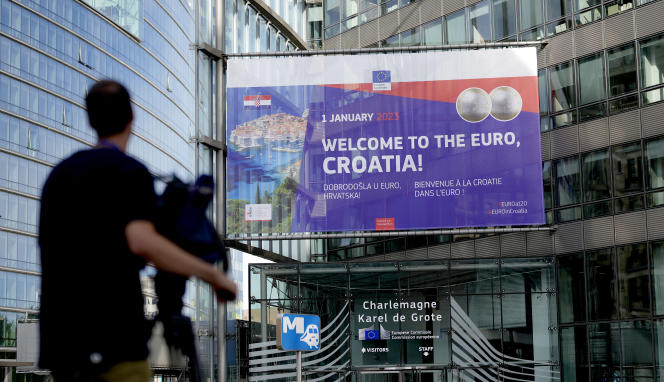The Council of the European Union, which represents the member countries, adopted on Tuesday July 12 the last legal acts validating Croatia’s transition to the euro on January 1, 2023. The former Yugoslav Republic will thus become the twentieth country member of the euro zone, seven years after the entry of Lithuania. Croatia will abandon its national currency, the kuna, which will be exchanged at the rate of 7.5345 kuna for 1 euro, the Council announced in a press release.
“I would like to congratulate my counterpart, Zdravko Maric, and Croatia as a whole,” said Czech Finance Minister Zbynek Stanjura, whose country holds the rotating Council Presidency. Croatia has successfully fulfilled all required economic criteria and will pay in euros from 1 January 2023.”
The event was marked by a signing ceremony in front of the press in Brussels, in the presence of the President of the European Central Bank (ECB), Christine Lagarde, the Vice-President of the Commission Valdis Dombrovskis and the Commissioner for the Economy Paolo Gentileni.
Three hundred and forty-five million users
The Commission had given the green light to this accession on June 1, considering that Croatia met all the conditions. The end of the procedure for Croatia’s accession to the single European currency comes at a time when the currency, which has weakened in recent months in the context of the war in Ukraine, has reached parity with the dollar, for the first time since December 2002.
At the start of the year, the euro also celebrated its 20th anniversary as a fiduciary currency. By 1 January 2002, millions of Europeans in twelve countries had given up their liras, francs, deutsche marks and drachmas for euro coins and banknotes.
They have since been joined by seven other countries: Slovenia in 2007, Cyprus and Malta in 2008, Slovakia (2009), Estonia (2011), Latvia (2014) and finally Lithuania in 2015. already 345 million inhabitants, pending Croatia.
The single currency is a symbol of European unity and sovereignty. All EU countries have theoretically committed to joining as soon as they meet the conditions, but no timetable is set. The only exception: Denmark negotiated an exemption after a referendum in 2000 in which the Danes rejected the euro.


















